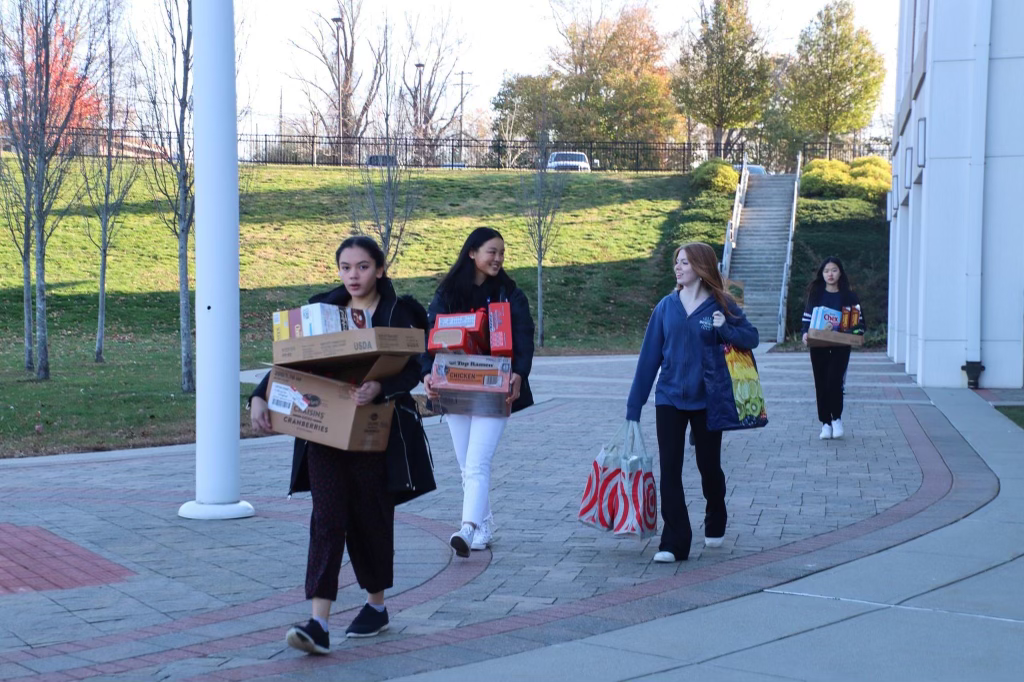Learning Through Service (LTS) has been a part of Waterford High School (WHS) for over 20 years. To graduate, seniors were required to have 80 hours of community service.
In December 2023, the Waterford Board of Education (BOE) abolished the requirement for LTS hours. Kirk Samuelson and the administration requested retraction of LTS requirements for many reasons.
In 2022, Kirk Samuelson, Mandy Batty and Tracy Moore decided to spend their first year observing the systems and practices that were already in place at WHS. Samuelson wanted to “make sure everything that we are doing or asking of our students and staff is good for kids.”
However, on field day that year, Samuelson noticed a larger than usual group of students gardening. These kids were “helping out to get LTS hours right before graduation.” This generated many concerns for Samuelson as he “wanted kids to be involved in field day activities; there are fun things in school that we do to build school spirit and community.”
This incident stuck with him, leading Samuelson and his administration to research how other schools handle LTS. They noticed that the educational landscape has changed since Covid and fewer community partners are having high school kids volunteer. They also noticed a changing demographic at WHS leading to their main concern: inequity.
Samuelson noticed that there are many students whose first language is not English, which could make it harder for them to find and arrange volunteer work, resulting in “hindering their ability to contribute fully and learn from the experience, potentially causing frustration and anxiety.”
Another concern was the impact that this requirement could have on students’ families. Volunteering requires transportation that often has parents searching for childcare for younger siblings, which many students at WHS need to provide for their siblings. This scenario could put the student under stress in addition to their volunteer requirement. The past parameters of the LTS requirement did not take into consideration that some students were unable to complete these hours on top of all other family responsibilities.
The final concern, which Samuelson delineated in his reasoning to the BOE, is student employment. Many students either want to or have to work to provide financial support to themselves or their families. As Samuelson stated in his proposal, “For some, choosing between paid work and volunteering is a financial necessity.” Samuelson did not want a student to have to make that choice.
However, Samuelson has made it clear that he still wholeheartedly supports and encourages student volunteering. He recognized the importance of community service and retained the LTS coordinator to promote volunteer opportunities and encourage students to help their community.
Additionally, there are lots of incentives for students to volunteer. For example, there is a volunteer requirement for the National Honor Society (NHS) and other honor societies at WHS. Additionally, There is still recognition for students who exceed expectations with volunteering, such as the senior and underclassmen award ceremonies and scholarships. There is also the Waterford Youth and Family Services and the Rotary Club that recognizes students.
Samuelson believes that “volunteerism should be intrinsic.” His goal with this policy change is to focus on quality over quantity volunteers.
When asked about local organizations suffering from this change, Samuelson relayed that, while it is a valid concern, this allows organizations to go out and advertise themselves to students. He still believes that students should, and will, help out local organizations.
When talking with organizations like Camp Dash, Samulelson noted, “Last year we had fewer volunteers than in the past. But they said it was one of the most well run programs because the kids who were there wanted to be there and took leadership roles, so it ended up being more successful.”
Samuelson also wants students to have time to engage within the community at WHS.
“The hope is that the students will get involved with things at school now that they have more time to do so, now that they have the choice to volunteer or not.”
Francis Silvestri, an English teacher at WHS and a main contributor to the Waterford Youth Basketball and Little League programs has a different perspective.
Silvestri’s main concern is the lack of volunteers for these two programs: “For the last year it has been a struggle to get volunteers.” He notes that usually older siblings of players tend to volunteer.
“Outside of that, it’s just tough. We used to have kids volunteer at the concession stand or help out with the scoreboard… but now there’s no high school kids doing that anymore.”
He understands and agrees with the reasoning behind the removal of this requirement, but also thinks that “a lot of the organizations that depended on that are suffering.” From what he has observed as somebody who helps run an organization, he just doesn’t see people volunteering anymore.
Adding another organization viewpoint, Waterford Public Library (WPL) Director Chris Johnson thinks that student volunteers are integral to the library. But, she also “understand(s) that today’s high school students have many competing demands for their time” and hopes that students will still continue to help out.
Head of Adult Services at the library, Jill Adams, believes that volunteering provides “a work ethic: being on time and managing time, and being dependable and professional” along with many other essential life skills.
Head of Youth Services at the library, Jenna Biovona, comments that “In the past we had teen volunteers almost every day of the week helping with a wide range of tasks that directly benefited the community.” She also added that volunteers are exposed to programs and resources that most people might not be aware of.
The Department heads at the WPL share concerns with the BOE’s decision and how it will affect the future of the WPL.
From a student perspective, NHS president, Alex Startz, remarked:
“I can see the reasoning behind it, but there are a lot of consequences”, Startz remarked regarding the decision, stating concern of the fate of local organizations who rely on such volunteers.
As president, he is worried about the effect on the NHS. Startz argues that “Not having a graduation requirement (to volunteer) could take away incentive for these kids to even apply.” He believes that the NHS volunteer requirement is not well advertised, and, “if you don’t meet that requirement, you won’t get in.”
The fate of volunteering at WHS is still uncertain, moreover, time will only tell if this administrative decision will be one that benefits or hurts WHS.




Mr O'Connor • Jan 15, 2025 at 10:41 am
Nice article Julia! I was involved with LTS from the beginning of our program. I wrote the grant that got us our first LTS coordinator position. The original goal was that we would incorporate Service Learning into the curriculum. Over 4 years and 24 classes minimum, studen ts would be able to get the majority of the service hours through class projects(4 hours per class). The program then shifted to a secretarial check off of the 80 hours. The orginal concept was to phase out the grad requirement with integrated service projects in the curriculum. Along the way, the program lost sight of that goal. I believe there is a need and desire for that original goal of integrated service in the curriculum in addition to those who go above and beyond. It is time to rethink service, not cut it.